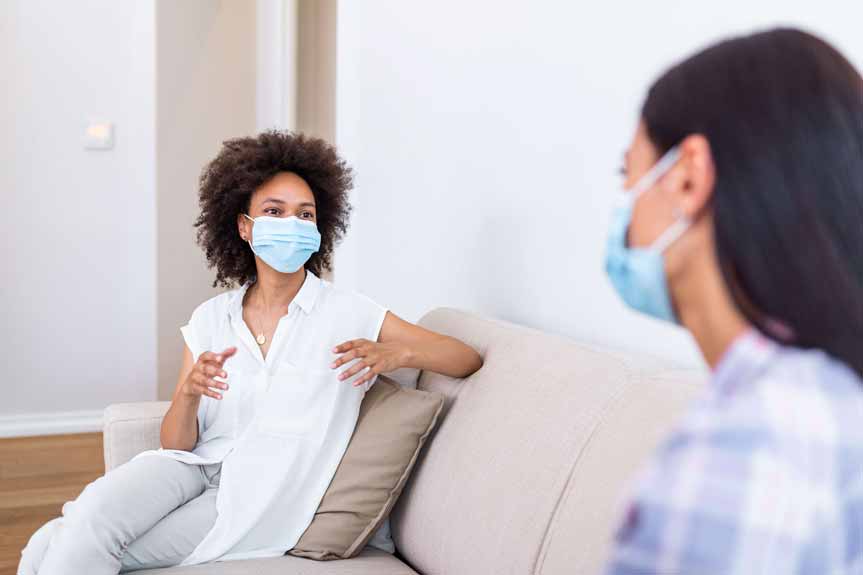What to Do if You Think You Have COVID-19

If you’re experiencing symptoms of the novel coronavirus (COVID-19), you may wonder whether to call your doctor or go to the emergency room. Here are some guidelines about treatment and testing from the Centers for Disease Control and Prevention (CDC) and other experts.
Check for Emergency Warning Signs
If you have any of these emergency warning signs identified by the CDC1, the CDC states that you should get medical help immediately:
- Trouble breathing
- Persistent pain or pressure in the chest
- New confusion or inability to arouse
- Bluish lips or face
Call 911 and tell them that you think you have COVID-19. The CDC recommends wearing a cloth face covering before help arrives, if possible.
Contact Your Primary Care Provider
If you don’t display any emergency signs, the CDC recommends you call your primary care provider instead. Your doctor will advise you on whether you can safely treat your symptoms at home or if you should seek medical care. Do not go into your doctor’s office without calling first and letting them know that you think you have coronavirus. Only visit the office if your doctor tells you to come in. You don’t want to expose other people to the virus.
Should I Get Tested?
If you think you have coronavirus, your doctor can help you determine whether you should get tested. Each state has its own guidelines for how to qualify for a test, but many of them require a doctor’s order2.
CNET reports that testing is being prioritized for hospitalized patients, healthcare workers, first responders, and high-risk patients such as those with underlying health conditions3. This is because the United States has a limited supply of test kits right now. Geographic area is also a factor. Test kits are being diverted to areas with a higher number of cases like New York City.
Self-Isolate and Treat Mild Symptoms with Home Remedies
If you think you might have coronavirus, the CDC recommends you stay at home and don’t go out except to get medical care. Isolate yourself from other people and animals in your home. If you need to be around other people, wear a cloth face covering. Try to disinfect the surfaces you touch a lot daily but avoid disinfecting common areas in the home.
Use over-the-counter medications to treat mild COVID-19 symptoms like fever, aches, and cough. Many people develop a mild case of coronavirus that can be treated at home.
How Long Do I Need to Self-Isolate?
According to the CDC, you need to wait until you’ve met all of these criteria4 before you leave your house after self-isolating:
- You have no fever for at least 72 hours without using fever-reducing medication.
- Your other symptoms have improved.
- It has been at least 7 days since your symptoms first appeared.
- If you do get tested, also make sure you have two negative tests in a row, 24 hours apart, before leaving your house.
Are There Any Treatments for COVID-19?
There are currently no CDC-approved treatments for coronavirus. However, researchers are testing several potential treatments, including plasma from recovered COVID-19 patients and various antiviral medications such as hydroxychloroquine and chloroquine5. Scientists are also starting to use the drug Colchicine to treat patients within hours of a COVID-19 diagnosis6.
If you develop symptoms of coronavirus, the best thing you can do is ask your doctor for advice. In many cases, you can treat symptoms at home, but seek urgent care if you have emergency warning signs. Regardless of whether you have symptoms, stay home as much as possible and practice social distancing. The CDC recommends avoiding close contact with people and wearing a cloth face mask to protect yourself and others from the virus7.
Related Content:
- How to Manage Anxiety During COVID-19
- Does Having a Chronic Illness Increase My Risk for COVID-19?
- Going Out in Public During COVID-19: Should I Be Nervous?
- Finding a Therapist During the COVID-19 Crisis
- Is it Seasonal Allergies or COVID-19?
- Breaking News: Can Colchicine Treat COVID-19?
- OTC Medications to Treat Mild COVID-19 Symptoms
- How to Manage Anxiety During COVID-19
Sources:
- https://www.cdc.gov/coronavirus/2019-ncov/if-you-are-sick/steps-when-sick.html
- https://www.cnet.com/how-to/can-you-get-tested-for-coronavirus-today-heres-who-qualifies-for-covid-19-testing/
- https://www.cnet.com/how-to/can-you-get-tested-for-coronavirus-today-heres-who-qualifies-for-covid-19-testing/
- https://www.cdc.gov/coronavirus/2019-ncov/if-you-are-sick/steps-when-sick.html
- https://www.health.harvard.edu/diseases-and-conditions/treatments-for-covid-19
- https://www.americaspharmacy.com/blog/breaking-news-can-colchicine-treat-covid-19
- https://www.cdc.gov/coronavirus/2019-ncov/prevent-getting-sick/prevention.html
